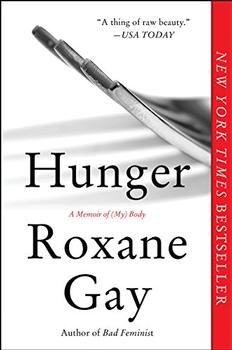Summary | Excerpt | Reviews | Beyond the Book | Readalikes | Genres & Themes | Author Bio

A Memoir of (My) Body
by Roxane Gay
A psychiatrist talked to those of us assembled about how to prepare for the surgery, how to deal with food once our stomachs became the size of a thumb, how to accept that the "normal people" (his words, not mine) in our lives might try to sabotage our weight loss because they were invested in the idea of us as fat people. We learned how our bodies would be nutrient-deprived for the rest of our lives, how we would never be able to eat or drink within half an hour of doing one or the other. Our hair would thin, maybe fall out. Our bodies could be prone to dumping syndrome, a condition whose name doesn't require a great deal of imagination to decipher. And of course, there were the surgical risks. We could die on the operating table or succumb to infection in the days following the procedure.
It was a good news/bad news scenario. Bad news: our lives and bodies would never be the same (if we even survived the surgery). Good news: we would be thin. We would lose 75 percent of our excess weight within the first year. We would become next to normal.
What those doctors offered was so tempting, so seductive: this notion that we could fall asleep for a few hours, and within a year of waking up, most of our problems would be solved, at least according to the medical establishment. That is, of course, if we continued to delude ourselves that our bodies were our biggest problem.
After the presentation there was a question-and-answer session. I had neither questions nor answers, but the woman to my right, the woman who clearly did not need to be there because she was no more than forty or so pounds overweight, dominated the session, asking intimate, personal questions that broke my heart. As she interrogated the doctors, her husband sat next to her, smirking. It became clear why she was there. It was all about him and how he saw her body. There is nothing sadder, I thought, choosing to ignore why I was sitting in that same room, choosing to ignore that there were a great many people in my own life who saw my body before they ever saw or considered me.
Later in the day, the doctors showed videos of the surgery—cameras and surgical tools in slick inner cavities cutting, pushing, closing, removing essential parts of the human body. The insides were steamy red and pink and yellow. It was grotesque and chilling. My father, on my left, was ashen, clearly shaken by the brutal display. "What do you think?" he asked quietly. "This is a total freak show," I said. He nodded. This was the first thing we had agreed on in years. Then the video ended and the doctor smiled and chirped that the procedure was brief, done laparoscopically. He assured us he had done over three thousand operations, lost only one patient—an 850-pound man, he said, his voice dropping to an apologetic whisper, as if the shame of that man's body could not be spoken with the full force of his voice. Then, the doctor told us the price of happiness—$25,000, minus a $270 discount for the orientation fee once a deposit for the procedure was made.
Before this torment was over, there was a one-on-one consultation with the doctor in a private examination room. Before the doctor entered, his assistant, an intern, took down my vital information. I was weighed, measured, quietly judged. The intern listened to my heartbeat, felt my throat glands, made some additional notes. The doctor finally breezed in after half an hour. He looked me up and down. He glanced at my new chart, quickly flipping through the pages. "Yes, yes," he said. "You're a perfect candidate for the surgery. We'll get you booked right away." Then he was gone. The intern wrote me prescriptions for the preliminary tests I would need, and I left with a letter verifying that I'd completed the orientation session. It was clear that they did this every day. I was not unique. I was not special. I was a body, one requiring repair, and there are many of us in this world, living in such utterly human bodies.
Excerpted from Hunger by Roxane Gay. Copyright © 2017 by Roxane Gay. Excerpted by permission of Harper. All rights reserved. No part of this excerpt may be reproduced or reprinted without permission in writing from the publisher.
Censorship, like charity, should begin at home: but unlike charity, it should end there.
Click Here to find out who said this, as well as discovering other famous literary quotes!
Your guide toexceptional books
BookBrowse seeks out and recommends the best in contemporary fiction and nonfiction—books that not only engage and entertain but also deepen our understanding of ourselves and the world around us.